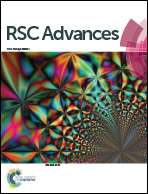Riboflavin conjugated temperature variant ZnO nanoparticles with potential medicinal application in jaundice
Abstract
A single step rapid synthesis of zinc oxide nanoparticles (ZnO NPs) in a green approach has been demonstrated via conjugating the natural product riboflavin by varying temperature. The conjugation of riboflavin to ZnO NPs was confirmed by ultraviolet-visible (UV-VIS) spectroscopy and photoluminescence (PL) intensity. The crystallinity and presence of functional groups in the temperature variant riboflavin conjugated ZnO NPs was determined by the X-ray diffraction (XRD) technique and Fourier transformed infrared (FT-IR) spectroscopy respectively. The average diameter of the synthesized nanoparticles is about ∼40 nm in spherical shape which has been preliminarily revealed by field emission scanning electron microscopy (FESEM) analysis and further confirmed by high-resolution transmission electron microscopy (HRTEM). The synthesized temperature variant ZnO nanoparticles with the aid of riboflavin showed significant ameliorative efficiency against jaundice stress at molecular and cellular levels in mice models. Biochemical parameters, different cytokine profiling (Th1 & Th2 cells) and their corresponding m-RNA expressions have been studied by the enzyme-linked immunosorbent assay (ELISA) and real-time polymerase chain reaction (RT-PCR) in the presence of riboflavin conjugated ZnO NPs synthesized at 60 °C and 30 °C temperature (Ribo-ZnO30/Ribo-ZnO60). Substantial Ribo-ZnO60 assisted improvement (p > 0.001) of the thymus-dependent functions and protein expressions of other genes associated with jaundice were observed by Western blotting. The supplementation of Ribo-ZnO60 treatment is more active in histologically recovering the liver and kidney tissues than Ribo-ZnO30 due to their particle nature and more phases with uniform size.


 Please wait while we load your content...
Please wait while we load your content...